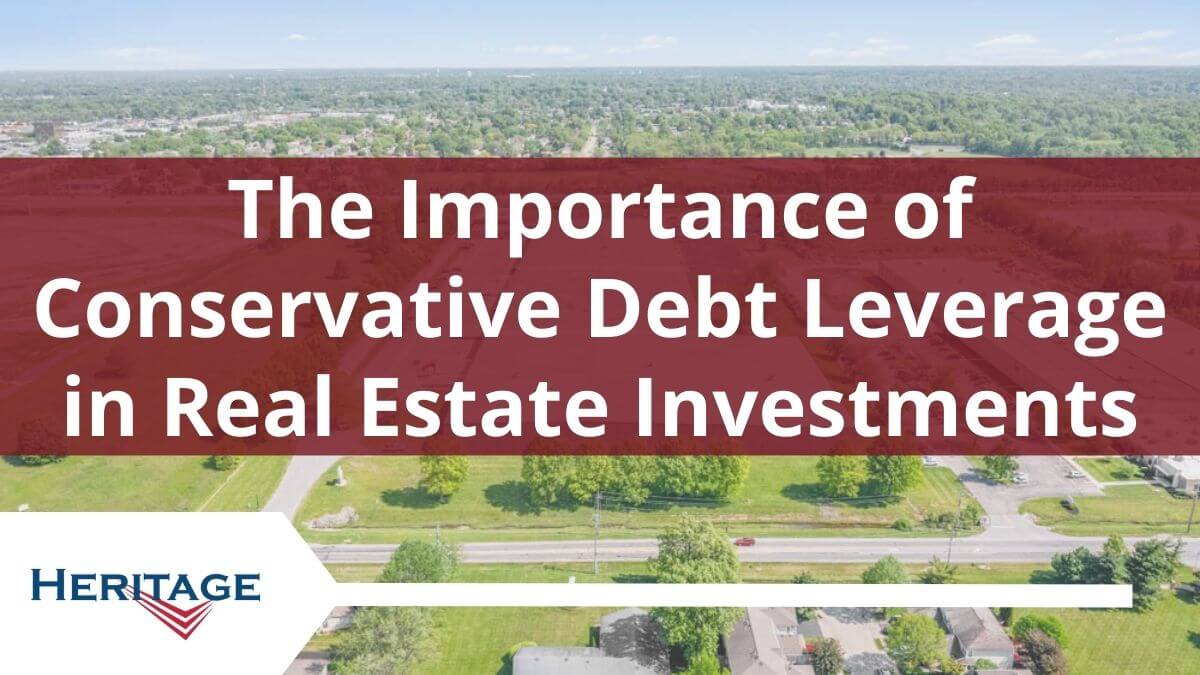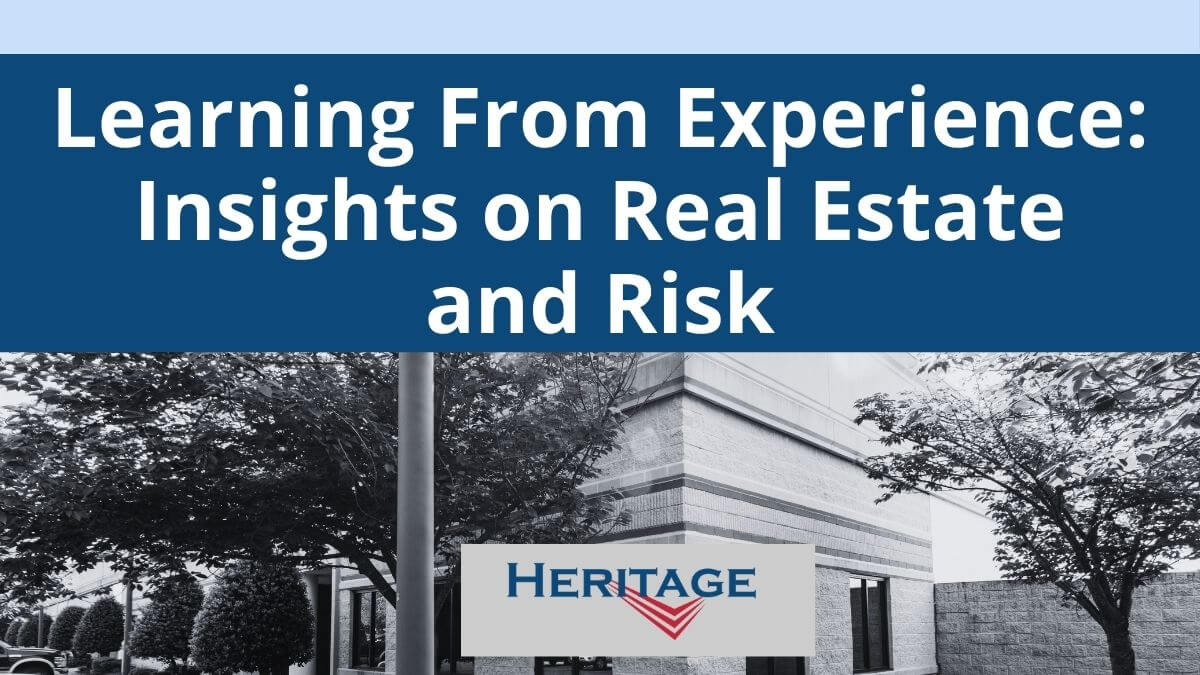One of the most critical principles at the core Heritage Capitals’s philosophy is preserving capital—it is paramount.
One of the most important ways we protect investor capital is by not over-leveraging. We have experience in taking big loans with correspondingly low leverage in the past when we were building the business. We wised up with age, and now do not like to go above 65% loan-to-value.
This threshold gives us a nice cushion and it is crucial for maintaining a safe investment profile. Ensuring there is a cushion for our debt service coverage ratios is critical. It is all about making sure we are comfortably covering our debt obligations without stretching too thin.
Our next investment is under contract. Please join the waitlist for priority access when the deal goes live.
Managing Interest Rate Exposure
Another key part of our strategy is managing interest rate exposure. We accomplish this through hedging or protection on our interest rates—either through a fixed-rate loan or employing financial tools such as an interest rate cap or swap (see below). Essentially, all routes lead to the same outcome: establishing a predictable, capped rate which ultimately provides stability.
When putting together a loan and crafting a deal, it is also vital to match debt maturity with the optimal timing in the property market to execute our business plan effectively. And let us face it—there is also an element of luck involved in avoiding unforeseen black swan events that could coincide with critical points like loan maturities or lease renewals.
We have always believed that those who work the hardest tend to be the luckiest. So, when we mention luck, we are referring to something that comes from experience and hard work—nothing else.

Portfolio Management
In addition, we plan in a way that our 'dominoes' are far apart and strategically distance our financial commitments to avoid a chain reaction from any single event affecting the entirety of our portfolio. This requires us to space our overall portfolio loan maturities apart so that a multitude of them do not come due at the same time. This strategic spacing ensures resilience and provides additional security for our investors' capital.
We further prioritize the financial stability of our developments by ensuring that our assets are kept separate and not cross-collateralized.
These tactics help not only prevent financial strain but also keeps us engaged in the market regularly, allowing us to stay informed about opportunities and refinance options.
Managing Debt Effectively
We are constantly thinking about how to handle our debt. It is part of our proactive management style. When considering variable versus fixed-rate loans, even with a floating rate loan or variable rate loan, we implement caps or hedging strategies such as interest rate swaps to effectively create a fixed-rate scenario or establish a ceiling on potential interest costs.
The decision between short-term and long-term financing depends on various factors including lease durations, our business plan objectives, and the current interest rate environment. In low-interest periods, locking in rates for an extended period can be advantageous; conversely, when rates are higher, flexibility is preferred to capitalize on potential decreases.
Refinancing serves as a key tool for equity extraction when appropriate. While we are cautious not to over-leverage properties, after holding an asset for a significant duration—typically five to ten years—we assess opportunities for refinancing.
For example, we currently have a property under consideration for refinancing within the next few years; it has accrued considerable equity over its six-year loan term. Extracting equity through refinancing is an integral part of our strategy but requires patience and timing—it is usually not feasible within short three-year windows but rather over longer periods where value has had time to accumulate.

Each Project an Island
All our projects stand on their own financially, whichis a key component in how we manage risk. We consciously avoid pooling all investments into one fund because if a 'black swan' event occurs—like the shift to remote work affecting office spaces—it could jeopardize an entire portfolio if properties are interlinked. We have seen this happen to others in the market, and it is something we actively work to prevent by keeping each property as a separate entity.
When it comes to underwriting deals, we are always upfront about the unpredictable nature of real estate; what is guaranteed is that reality will deviate from the projections on our spreadsheets.
Our strategy involves conservative and realistic underwriting, resisting the temptation to manipulate numbers just to make prospects look more appealing or more dire than they truly are. Being overly pessimistic could mean never winning a deal because you are constantly expecting the worst!
With that said, being realistic yet conservative in our estimates is crucial for success in acquiring properties—and arguably the toughest part of this business. Sometimes, you must stretch beyond your comfort zone, especially if you believe strongly in a property's potential. It is like buying a house or negotiating for a car; you might have a set price in mind but occasionally need to offer more to secure what you want.
Relationships Really Do Matter
We employ professionals for leasing properties, managing expenses efficiently, appealing taxes, and obtaining favorable insurance terms. Making sure our team has access to the tools to make them as productive as possible is also vital. Our office systems have been upgraded to cloud-based solutions to maximize efficiency in billing and other administrative tasks. We understand that fostering good tenant relations is part of what we like to call our 'secret sauce'—though it is hardly a secret.
Maintaining relationships with stakeholders allows us to address any problems swiftly because issues are inevitable in this business. The ability to work things out through these connections
cannot be overstated—it is a cornerstone of how we protect capital investments.

Experience Matters Too
Something we have learned over the years is that the nature of a deal at its inception sets the tone for its entire lifecycle. If we encounter excessive difficulty from the outset, whether due to environmental hurdles or other roadblocks, it often signals ongoing challenges.
When too many compromises arise, our instinct tells us to proceed with caution or reconsider the venture altogether. This intuition is part of safeguarding investor capital—it is about recognizing when to push forward and when discretion is the better part of valor.
Having multiple generations worth of experience certainly bolsters this protective approach—it becomes ingrained in your DNA after decades in the industry. We have absorbed countless lessons from both successful ventures and those less fortunate; learning when it is time to walk away is as crucial as knowing when an opportunity should be seized.
Perhaps one of his most impactful teachings from my father was encouraging me to embrace risk—a nuanced art rather than a mere scientific calculation. Determining one's risk tolerance involves understanding how much uncertainty you can handle while still being able to sleep at night, using past experiences as a guidepost for future decisions.
Our number one rule at Heritage Capital is not just about avoiding loss—we are well aware that you don’t win ball games (or grow your capital) without playing a offense.
But a defensive posture can absolutely contribute to a win, whether that is a Superbowl victory or obtaining market-leading returns for investors. It is about employing wisdom gained over time, leveraging technology effectively, fostering strong relationships, and respecting each project's unique trajectory from start to finish.



